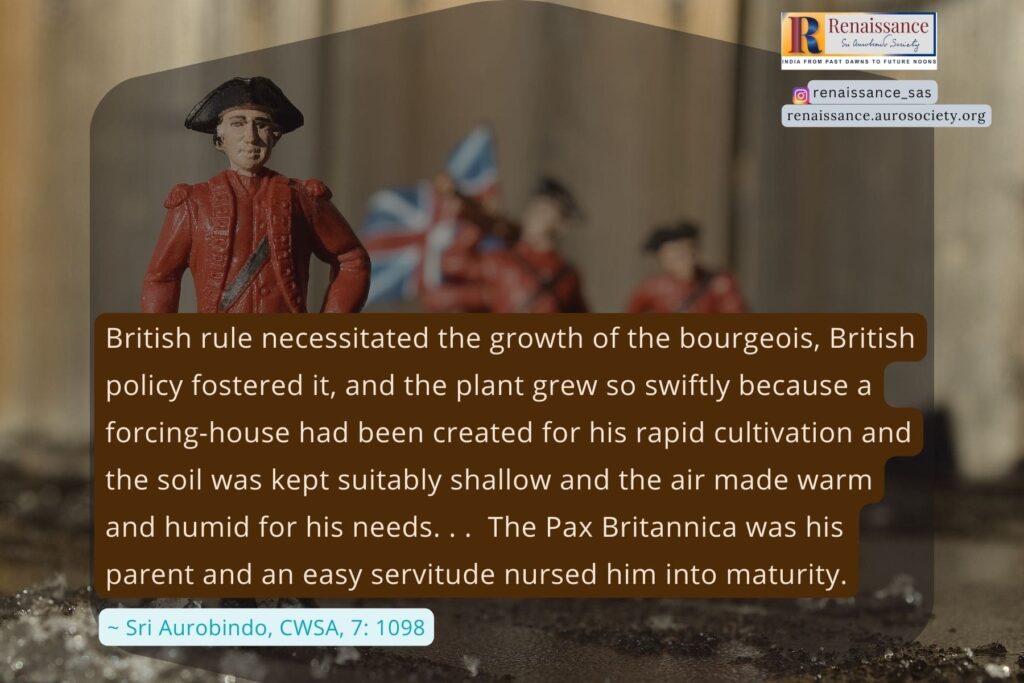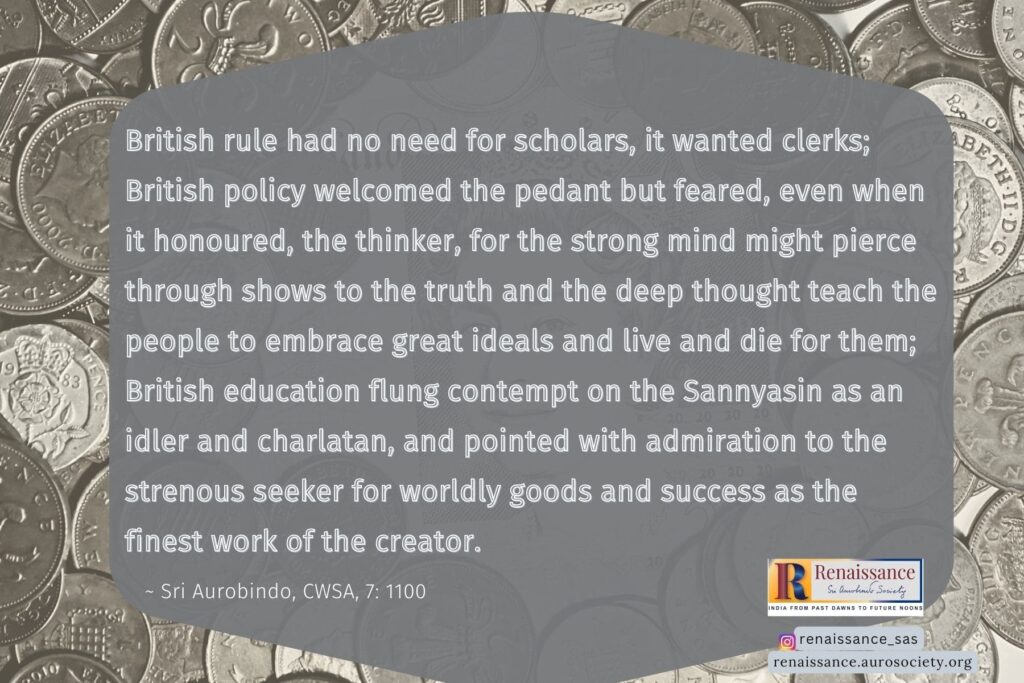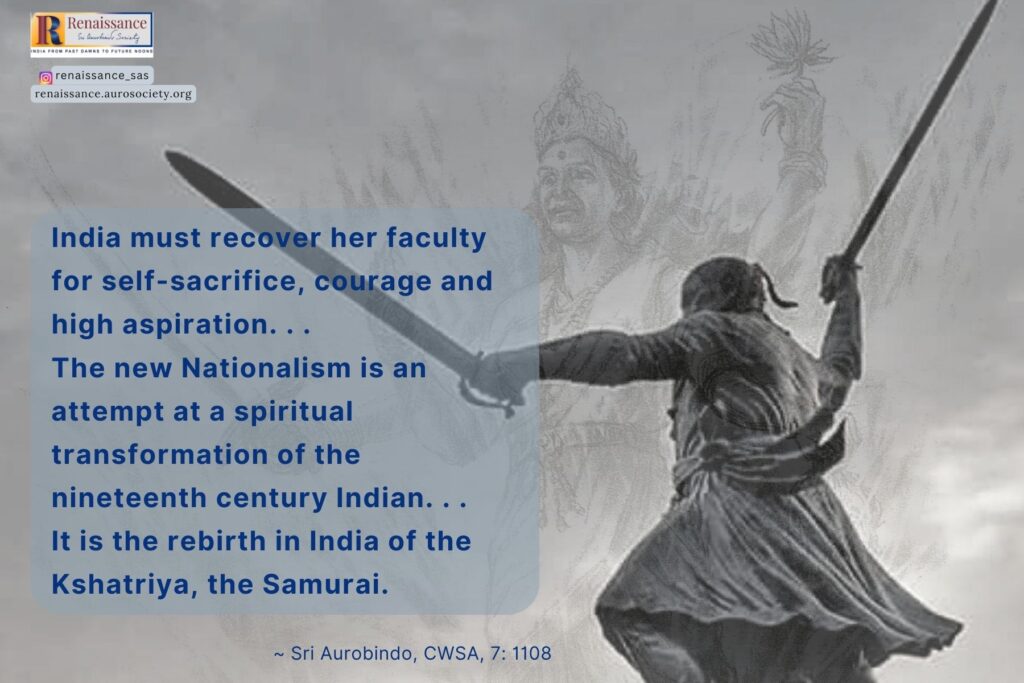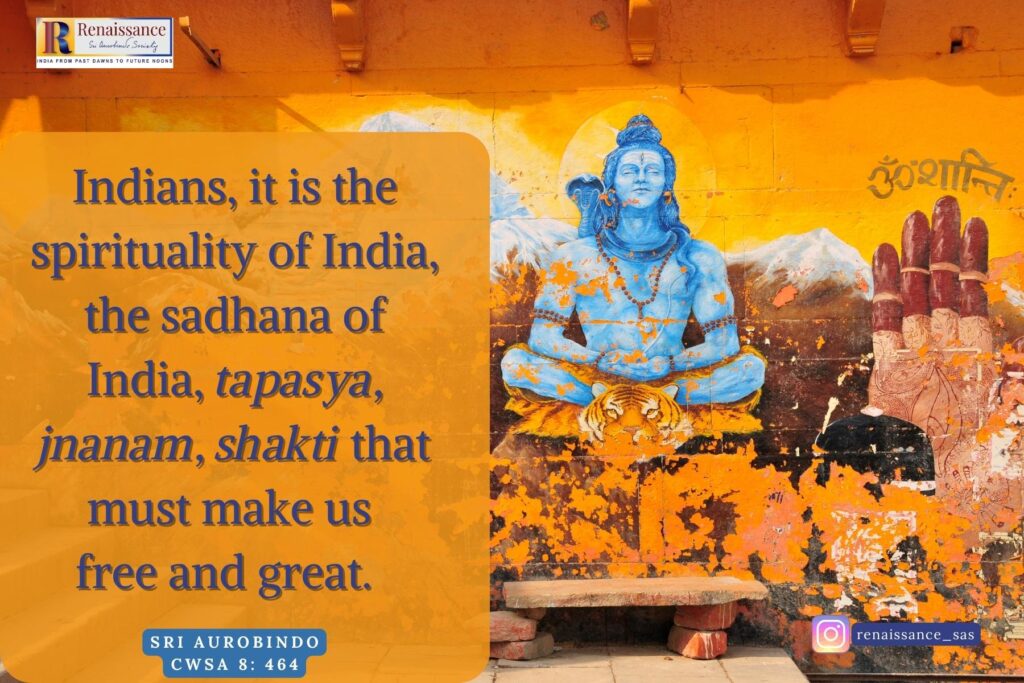CONTINUED FROM PART 1

Emergence and Domination of the Bourgeois – A Rapid Transformation
This emergence and domination of the bourgeois was a rapid transformation, not unparalleled in history, for something of the same kind seems to have happened in the provinces of the Roman Empire under the Caesars, but astonishing in a people whose past history & temperament had been so supremely unPhilistine.
That a society which had only a few decades ago prostrated itself before the naked ascetic and the penniless Brahmin, should now wear the monied man and the official as the tilak on its forehead, was indeed a marvellous revolution. But given the new conditions, nothing else could have happened.

How did British India Foster the Bourgeois?
British rule necessitated the growth of the bourgeois, British policy fostered it, and the plant grew so swiftly because a forcing-house had been created for his rapid cultivation and the soil was kept suitably shallow and the air made warm and humid for his needs. . . The Pax Britannica was his parent and an easy servitude nursed him into maturity.
For the first need of the bourgeois is a guaranteed and perfect security for his person, property and pursuits. Peace, comfort and safety are the very breath of his nostrils.
But he gravitates to a peace for whose preservation he is not called on to wear armour and wield the sword, a comfort he has not to purchase by the discomfort of standing sentinel over his liberties, or a safety his own alertness and courage must protect from the resurgence of old dangers.
The bourgeois in arms is not the true animal; the purity of his breed is sullied by something of the virtues and defects of the soldier. He must enjoy the fruits of peace and security he has not earned, without responsibility for their maintenance or fear of their loss. Such conditions he found in almost unparallelled perfection in British India.
Also read: The Conquest of India by the English
He was asked to stand as the head of a disarmed and dependent society, secured from external disturbance & tied down to a rigid internal tranquillity by the deprivation of all functions except those of breadwinner and taxpayer and to vouch himself to the world by a respectable but not remarkable education and achievement as the visible proof of England’s civilising mission in India. Such conditions were to the bourgeois as the moisture & warmth of the hothouse to the orchid. He grew in them, rank & luxurious.
Then again, for his perfection and dominance, the society he lives in must honour his peculiar qualities above all others and the substantial rewards and covetable distinctions of life [be] reserved for them chiefly or for them alone. The British rule gave him this honour, showered on him these rewards & distinctions, and Indian society, more & more moulded by British ideas, followed as a society almost inevitably follows the lead of the rulers.
“No Call for the High Qualities of Old”
Under the new dispensation of Providence there was no call for the high qualities of old, the Aryan or noble virtues which, whatever else failed or perished, had persisted in Indian character for thousands of years, since first the chariots rolled on the hither-side of the Indus.

What need for the Rajpoot’s courage, the robust manhood, the noble pride of the Kshatriya, when heroic and unselfish England claimed the right of shedding her blood for the safety of the land? What room for the gifts of large initiative, comprehensive foresight, wise aspiration which make the statesman, when a Bentinck or a Mayo, a Dufferin or a Curzon were ready & eager to take & keep the heavy burdens of Government out of the hands of the children of the soil?
The princely spirit, the eagle’s vision, the lion’s heart, these were things that might be buried away with the memories of the great Indian rulers of the past. Happy India, civilised and cared for by human seraphs from over the sea, had no farther need for them.
So from sheer inanition, from want of light, room and air, the Kshatriya died out of the soil which had first produced him and the bourgeois took his place.
But if room was none for the soldier & the statesman, little could be found for the Brahmin, the sage or the Sannyasin.
British rule had no need for scholars, it wanted clerks; British policy welcomed the pedant but feared, even when it honoured, the thinker, for the strong mind might pierce through shows to the truth and the deep thought teach the people to embrace great ideals and live and die for them; British education flung contempt on the Sannyasin as an idler and charlatan, and pointed with admiration to the strenous seeker for worldly goods and success as the finest work of the creator.
So Vyasa & Valmekie were forgotten for weavers of idle tales and Smiles and Sir Arthur Helps took their place as an instructor of youth, the gospel of Philistinism in its naked crudeness was beaten into the minds of our children when most malleable. Thus Ramdas was following Shivaji into the limbo of the unreturning past.

And if God had not meant otherwise for our nation, the Sannyasin would have become an extinct type, Yoga been classed among dead superstitions with witchcraft & alchemy and Vedanta sent the way of Pythagoras & Plato.
Nor was the old Vaishya type needed by the new dispensation. The Indian mechanician, engineer, architect, artist, craftsman got notice of dismissal; for to develop the industrial life of the country was no part of England’s business in India. As she had taken the functions of government and war into her own hands, so she would take that of production.
Whatever India needed, beneficent England with her generous system of free trade would supply and the Indian might sit at ease under his palm tree or, gladly singing, till his fields, rejoicing that Heaven had sent him a ruling nation so greedy to do him good. What was wanted was not Indian artisans or Indian captains of industry, but plenty of small shopkeepers and big middlemen to help conquer & keep India as a milch cow for British trade & British capital.
All the Great Types Tended to Disappear
Thus all the great types which are nurtured on war, politics, thought, spirituality, activity & enterprise, the outgrowths of a vigorous and healthy national existence, the high fruits of humanity who are the very energy of life to a community, were discouraged and tended to disappear and in their place there was an enormous demand for the bourgeois qualities.
The safe, respectable man, satisfied with ease and not ambitions of command, content with contemporary repute and not hankering after immortality, the superficial man who unable to think profoundly could yet pose among his peers as intellectual, who getting no true culture, wore a specious appearance of education, who guiltless of a single true sacrifice for his country, yet bulked large as a patriot, found an undisputed field open to him.
The rewards of life now depended on certain outward signs of merit which were purely conventional.
An University degree, knowledge of English, possession of a post in Government service or a professional diploma, a Government title, European clothes or a sleek dress and appearance, a big house full of English furniture, these were the badges by which Society recognized its chosen. These signs were all purely conventional.
The degree did not necessarily denote a good education nor the knowledge of English a wide culture or successful living into new ideas, nor the Government post administrative capacity, nor the diploma special fitness for the profession, nor the title any merit in the holder, nor the big house or fine dress a mastery of the art of social life, nor the English clothes, European grit, science and enterprise. . . Wealth, success, and certain outward signs of a facile respectability had become to our new civilised & refined society the supreme tests of the man.
All these were conditions unusually favourable to a rank luxuriance of the bourgeois type, which thrives upon superficiality and lives by convention.
The soil was suitably shallow, the atmosphere sufficiently warm & humid. The circumstances of our national life & the unique character of our education hastened & perfected the growth. . .

“India must recover her faculty for self-sacrifice, courage and high aspiration.”
. . . For good or for evil the middle class now leads in India, and whatever saving impulse comes to the nation, must come from the middle class, whatever upward movement begins, it must initiate and lead.
But for that to happen the middle class must by a miracle be transfigured and lifted above itself; the natural breeding ground of the bourgeois, it must become the breeding ground of the Samurai.
It must cease in fact to be a middle class and turn itself into an aristocracy, an aristocracy not of birth or landed possessions, not of intellect, not of wealth and commercial enterprise, but of character and action.
India must recover her faculty for self-sacrifice, courage and high aspiration. Such a transformation is the work which has been set before itself by the new Nationalism; . . . The new Nationalism is an attempt at a spiritual transformation of the nineteenth century Indian. . . It is the rebirth in India of the Kshatriya, the Samurai.
READ PART 1
~ Sri Aurobindo, CWSA, Vol. 7, pp. 1091-11108

~ Design: Beloo Mehra



